牛津译林版八年级上册英语Unit 5 Wild animals Grammar Using may for possibility 课件(共34张PPT)
文档属性
| 名称 | 牛津译林版八年级上册英语Unit 5 Wild animals Grammar Using may for possibility 课件(共34张PPT) |

|
|
| 格式 | ppt | ||
| 文件大小 | 692.5KB | ||
| 资源类型 | 教案 | ||
| 版本资源 | 牛津译林版 | ||
| 科目 | 英语 | ||
| 更新时间 | 2022-11-24 00:00:00 | ||
图片预览

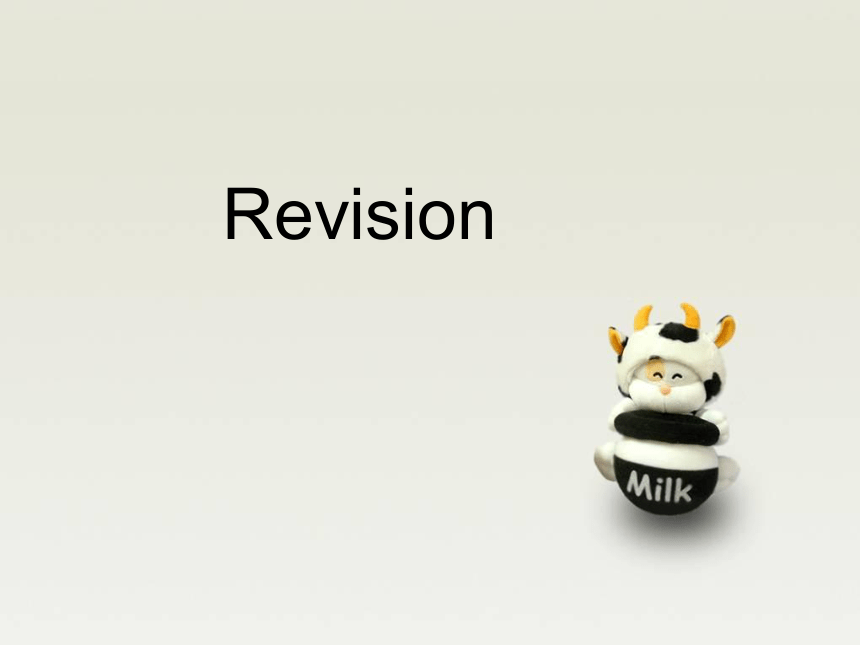
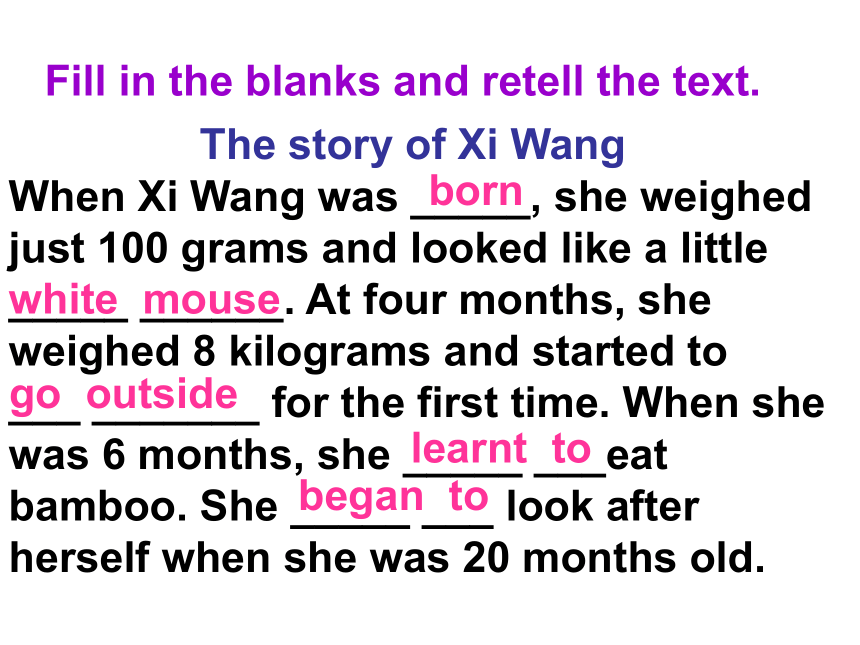
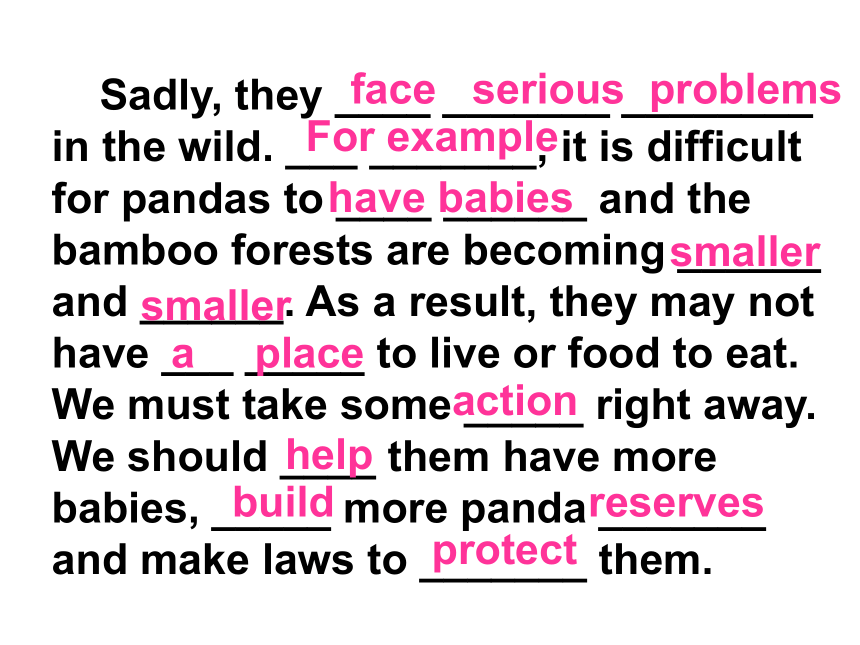

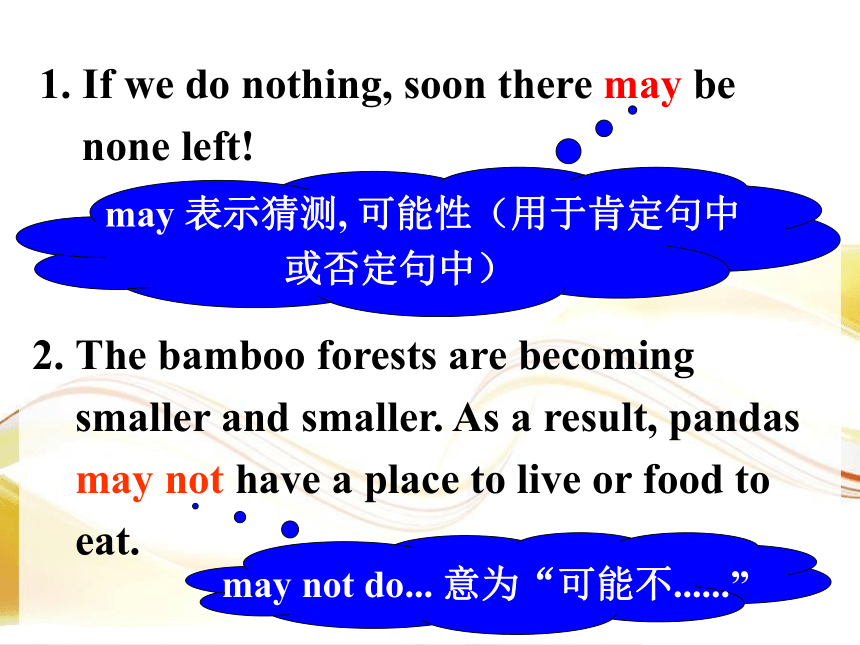

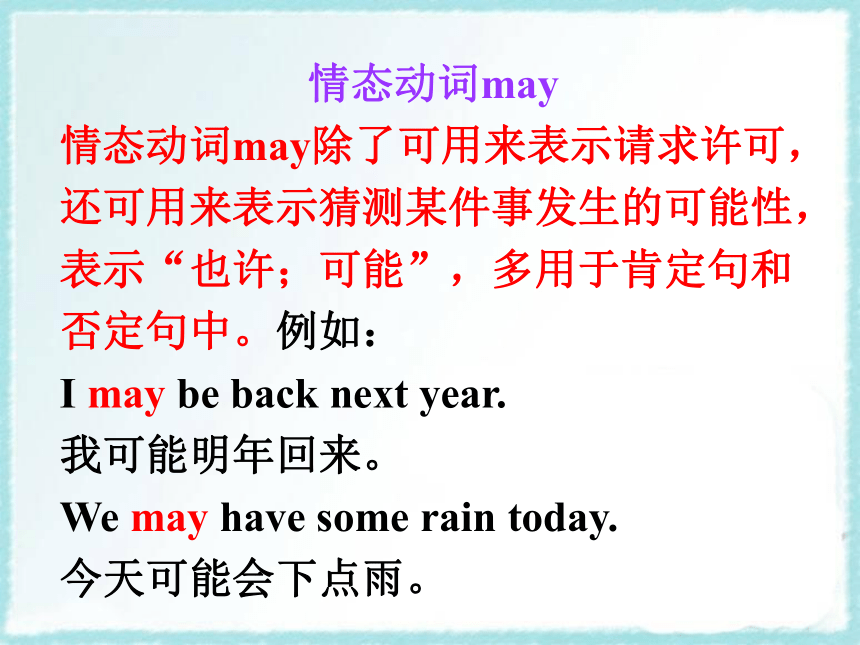

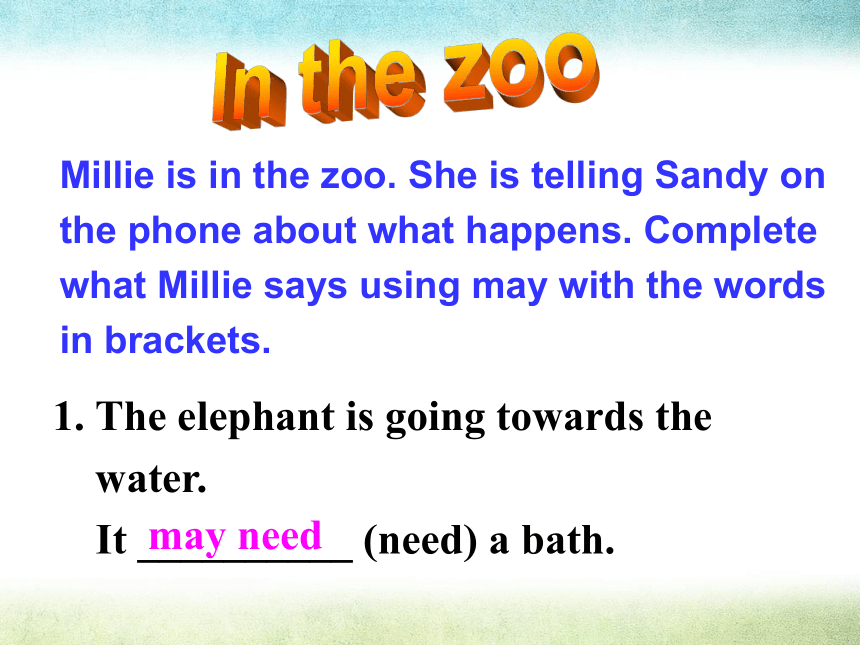
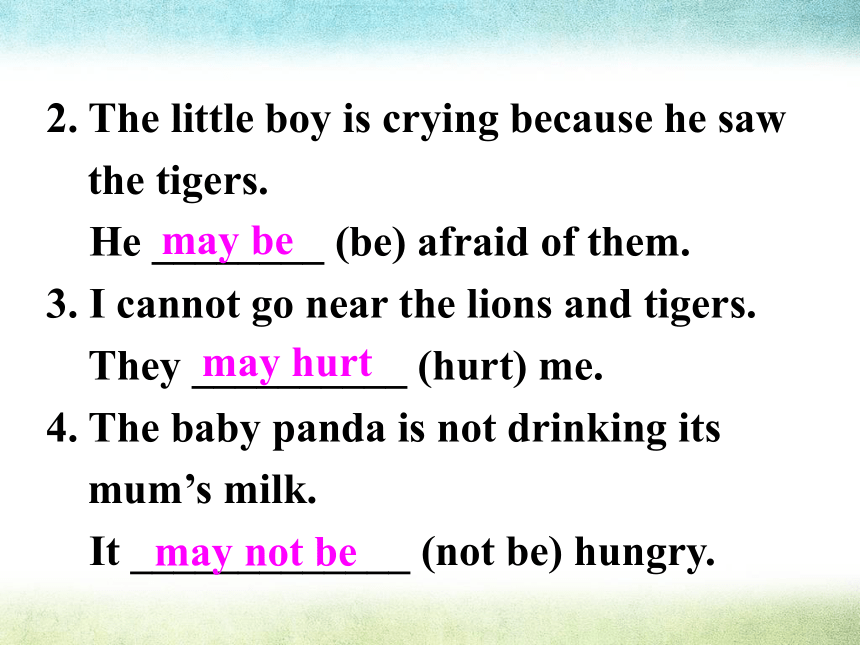
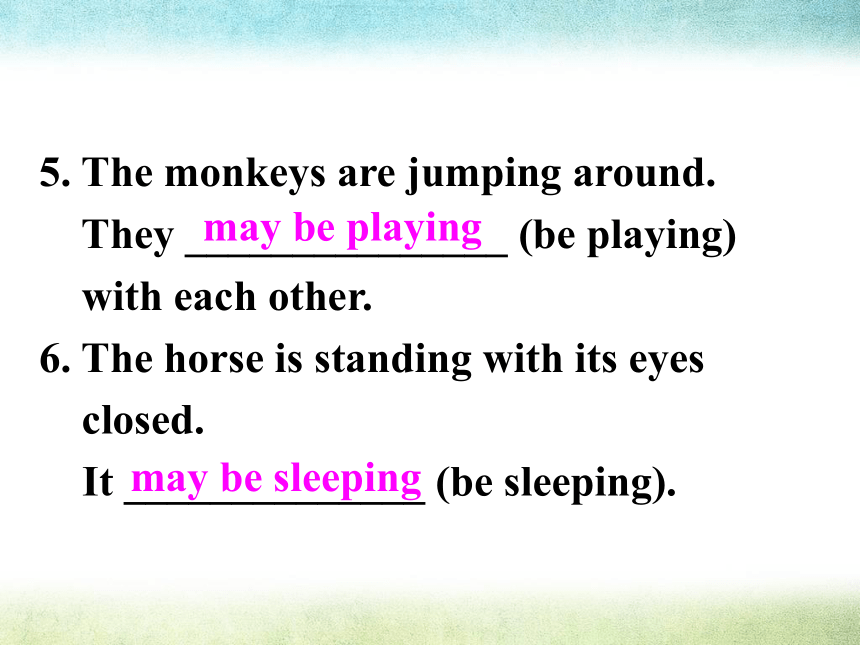
文档简介
(共34张PPT)
Revision
The story of Xi Wang
When Xi Wang was _____, she weighed just 100 grams and looked like a little _____ ______. At four months, she weighed 8 kilograms and started to
___ _______ for the first time. When she was 6 months, she _____ ___eat bamboo. She _____ ___ look after herself when she was 20 months old.
Fill in the blanks and retell the text.
born
white mouse
go outside
began to
learnt to
Sadly, they ____ _______ ________ in the wild. ___ _______, it is difficult for pandas to ____ ______ and the bamboo forests are becoming ______ and ______. As a result, they may not have ___ _____ to live or food to eat. We must take some _____ right away. We should ____ them have more babies, _____ more panda _______ and make laws to _______ them.
face serious problems
For example
have babies
smaller
a place
action
help
build
reserves
protect
smaller
A Using may for possibility
1. If we do nothing, soon there may be none left!
2. The bamboo forests are becoming smaller and smaller. As a result, pandas may not have a place to live or food to eat.
may 表示猜测, 可能性(用于肯定句中
或否定句中)
may not do... 意为“可能不......”
e.g.
1. The story may or may not be true.
2. Can that be true √
May that be true ×
3. He can’t know the truth.
他不可能知道真相。
He may not know the truth.
他可能不知道真相。
情态动词may
情态动词may除了可用来表示请求许可,还可用来表示猜测某件事发生的可能性,表示“也许;可能”,多用于肯定句和否定句中。例如:
I may be back next year.
我可能明年回来。
We may have some rain today.
今天可能会下点雨。
You may not like these words — diet and exercise.
你可能不喜欢这些字眼——节食和锻炼。
Millie is in the zoo. She is telling Sandy on the phone about what plete what Millie says using may with the words in brackets.
1. The elephant is going towards the water.
It __________ (need) a bath.
may need
2. The little boy is crying because he saw the tigers.
He ________ (be) afraid of them.
3. I cannot go near the lions and tigers.
They __________ (hurt) me.
4. The baby panda is not drinking its mum’s milk.
It _____________ (not be) hungry.
may be
may hurt
may not be
5. The monkeys are jumping around.
They _______________ (be playing) with each other.
6. The horse is standing with its eyes closed.
It ______________ (be sleeping).
may be playing
may be sleeping
B Using verbs + to-infinitives
动词+ 动词不定式
当句子中已经有谓语动词, 而我们又要表达不止一个动作概念时, 其余的动词可以使用非谓语形式表达。动词不定式就是动词的一种非谓语形式, 其基本形式是“to+动词原形”。 如:
他想课后踢足球。
注意:
动词不定式在句子中不作谓语, 因此没有人称、数和时态的变化。
He wants to play football after class.
My mother forgot to turn off the lights
yesterday.
我妈妈昨天忘记关灯了。
1.动词不定式在句中常作谓语动词的宾语, 这一类谓语动词常见的有:
agree choose decide forget
hope learn like plan
prepare promise refuse
remember seem want
wish would like
agree to do sth. 同意干
begin to do sth. 开始干
decide to do sth.决定干
fail to do sth. 做某事失败
forget to do sth. 忘记干
hope to do sth. 希望干
learn to do sth. 学着干 plan to do sth. 计划干
prepare to do sth. 准备干
remember to do. 记得干
try to do sth. 尝试干
want to do. 想要干
e.g. Where will you plan to visit
this summer holiday
今年暑假你打算去哪儿玩?
I hope to watch the sunset.
我想看日落。
I want to take some photos of the
sunrise.
我想拍几张日出的照片。
more verbs + to do (作宾语):
need promise seem start
pretend refuse
would like can’t wait try one’s best
ask sb. to do
tell sb. to do
invite sb. to do
want sb. to do
would like sb. to do
teach sb. to do
advise sb. to do
2. to do 做宾语补足语
hear sb. do
see sb. do
watch sb. do
make sb. do
let sb. do
help sb. do
但有的动词后跟不带to的不定式作宾补,如:
注意:
动词不定式的否定形式是“not to + 动词原形”。如:
You must promise not to be late again.
你必须保证不再迟到了。
remember to do sth.
remember doing sth.
forget to do sth.
forget doing sth.
记得去做某事
记得做过某事
忘记去做某事
忘记做过某事
e.g.
汤姆, 记得课后和我们一起打篮球。
我记得上个月写了一封信给你。
Tom, remember to play basketball
with us after class.
I remembered writing a letter to
you last month.
stop to do sth.
stop doing sth.
e.g. 让我们停下来休息一下。
不要说话。老师来了。
停下(正在做的)事去做 (另一件)事
停止做(正在做的)事
Let’s stop to have a rest.
Stop talking. The teacher is coming.
1. enjoy
Kitty enjoys dancing.
let
The teacher lets him read loudly.
3. practise
You should practise speaking often.
We don’t use ‘to’ after these verbs.
4. make
The joke makes me laugh and laugh.
5. help
She often helps me (to) carry water.
6. finish
You must finish doing your homework
on time.
1. Stop to talk, and get ready for the Maths class.
2. He often hears the girl sings in the next room.
3. It takes him half an hour getting there by bus.
talking
sing
to get
4 You must finish to do your homework when I come back from office.
5 Let me to help you to learn English.
doing
1. You must _____ (listen) to the teacher carefully in class.
2. Mary agreed _____ (go) shopping with Lucy.
3. Look! The boys ____________(play) football.
4. May decided ______ (buy) a book for Ann’s birthday.
5. Max tells funny jokes to make us ____(feel) happy.
listen
to go
are playing
to buy
feel
6. Let’s ____ (go) on a trip tomorrow.
7. The policeman told the boys __________
(not play) football in the street.
8. Would you like something ________ (drink)
9. _________ (not be) late for class again.
10. I plan ________(travel) around the
world in the summertime.
go
not to play
to drink
Don’t be
to travel
11. Daniel hopes _______(be) a doctor when he ________ (grow) up.
12. I prepare __________ (clean) my room this afternoon.
13. Do you want _______ (see) a film with me
to be
grows
to clean
to see
Revision
The story of Xi Wang
When Xi Wang was _____, she weighed just 100 grams and looked like a little _____ ______. At four months, she weighed 8 kilograms and started to
___ _______ for the first time. When she was 6 months, she _____ ___eat bamboo. She _____ ___ look after herself when she was 20 months old.
Fill in the blanks and retell the text.
born
white mouse
go outside
began to
learnt to
Sadly, they ____ _______ ________ in the wild. ___ _______, it is difficult for pandas to ____ ______ and the bamboo forests are becoming ______ and ______. As a result, they may not have ___ _____ to live or food to eat. We must take some _____ right away. We should ____ them have more babies, _____ more panda _______ and make laws to _______ them.
face serious problems
For example
have babies
smaller
a place
action
help
build
reserves
protect
smaller
A Using may for possibility
1. If we do nothing, soon there may be none left!
2. The bamboo forests are becoming smaller and smaller. As a result, pandas may not have a place to live or food to eat.
may 表示猜测, 可能性(用于肯定句中
或否定句中)
may not do... 意为“可能不......”
e.g.
1. The story may or may not be true.
2. Can that be true √
May that be true ×
3. He can’t know the truth.
他不可能知道真相。
He may not know the truth.
他可能不知道真相。
情态动词may
情态动词may除了可用来表示请求许可,还可用来表示猜测某件事发生的可能性,表示“也许;可能”,多用于肯定句和否定句中。例如:
I may be back next year.
我可能明年回来。
We may have some rain today.
今天可能会下点雨。
You may not like these words — diet and exercise.
你可能不喜欢这些字眼——节食和锻炼。
Millie is in the zoo. She is telling Sandy on the phone about what plete what Millie says using may with the words in brackets.
1. The elephant is going towards the water.
It __________ (need) a bath.
may need
2. The little boy is crying because he saw the tigers.
He ________ (be) afraid of them.
3. I cannot go near the lions and tigers.
They __________ (hurt) me.
4. The baby panda is not drinking its mum’s milk.
It _____________ (not be) hungry.
may be
may hurt
may not be
5. The monkeys are jumping around.
They _______________ (be playing) with each other.
6. The horse is standing with its eyes closed.
It ______________ (be sleeping).
may be playing
may be sleeping
B Using verbs + to-infinitives
动词+ 动词不定式
当句子中已经有谓语动词, 而我们又要表达不止一个动作概念时, 其余的动词可以使用非谓语形式表达。动词不定式就是动词的一种非谓语形式, 其基本形式是“to+动词原形”。 如:
他想课后踢足球。
注意:
动词不定式在句子中不作谓语, 因此没有人称、数和时态的变化。
He wants to play football after class.
My mother forgot to turn off the lights
yesterday.
我妈妈昨天忘记关灯了。
1.动词不定式在句中常作谓语动词的宾语, 这一类谓语动词常见的有:
agree choose decide forget
hope learn like plan
prepare promise refuse
remember seem want
wish would like
agree to do sth. 同意干
begin to do sth. 开始干
decide to do sth.决定干
fail to do sth. 做某事失败
forget to do sth. 忘记干
hope to do sth. 希望干
learn to do sth. 学着干 plan to do sth. 计划干
prepare to do sth. 准备干
remember to do. 记得干
try to do sth. 尝试干
want to do. 想要干
e.g. Where will you plan to visit
this summer holiday
今年暑假你打算去哪儿玩?
I hope to watch the sunset.
我想看日落。
I want to take some photos of the
sunrise.
我想拍几张日出的照片。
more verbs + to do (作宾语):
need promise seem start
pretend refuse
would like can’t wait try one’s best
ask sb. to do
tell sb. to do
invite sb. to do
want sb. to do
would like sb. to do
teach sb. to do
advise sb. to do
2. to do 做宾语补足语
hear sb. do
see sb. do
watch sb. do
make sb. do
let sb. do
help sb. do
但有的动词后跟不带to的不定式作宾补,如:
注意:
动词不定式的否定形式是“not to + 动词原形”。如:
You must promise not to be late again.
你必须保证不再迟到了。
remember to do sth.
remember doing sth.
forget to do sth.
forget doing sth.
记得去做某事
记得做过某事
忘记去做某事
忘记做过某事
e.g.
汤姆, 记得课后和我们一起打篮球。
我记得上个月写了一封信给你。
Tom, remember to play basketball
with us after class.
I remembered writing a letter to
you last month.
stop to do sth.
stop doing sth.
e.g. 让我们停下来休息一下。
不要说话。老师来了。
停下(正在做的)事去做 (另一件)事
停止做(正在做的)事
Let’s stop to have a rest.
Stop talking. The teacher is coming.
1. enjoy
Kitty enjoys dancing.
let
The teacher lets him read loudly.
3. practise
You should practise speaking often.
We don’t use ‘to’ after these verbs.
4. make
The joke makes me laugh and laugh.
5. help
She often helps me (to) carry water.
6. finish
You must finish doing your homework
on time.
1. Stop to talk, and get ready for the Maths class.
2. He often hears the girl sings in the next room.
3. It takes him half an hour getting there by bus.
talking
sing
to get
4 You must finish to do your homework when I come back from office.
5 Let me to help you to learn English.
doing
1. You must _____ (listen) to the teacher carefully in class.
2. Mary agreed _____ (go) shopping with Lucy.
3. Look! The boys ____________(play) football.
4. May decided ______ (buy) a book for Ann’s birthday.
5. Max tells funny jokes to make us ____(feel) happy.
listen
to go
are playing
to buy
feel
6. Let’s ____ (go) on a trip tomorrow.
7. The policeman told the boys __________
(not play) football in the street.
8. Would you like something ________ (drink)
9. _________ (not be) late for class again.
10. I plan ________(travel) around the
world in the summertime.
go
not to play
to drink
Don’t be
to travel
11. Daniel hopes _______(be) a doctor when he ________ (grow) up.
12. I prepare __________ (clean) my room this afternoon.
13. Do you want _______ (see) a film with me
to be
grows
to clean
to see
